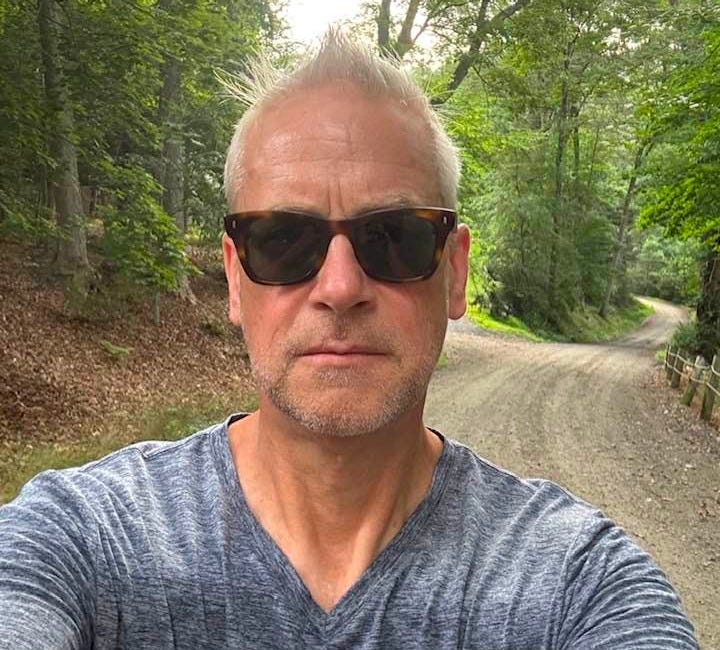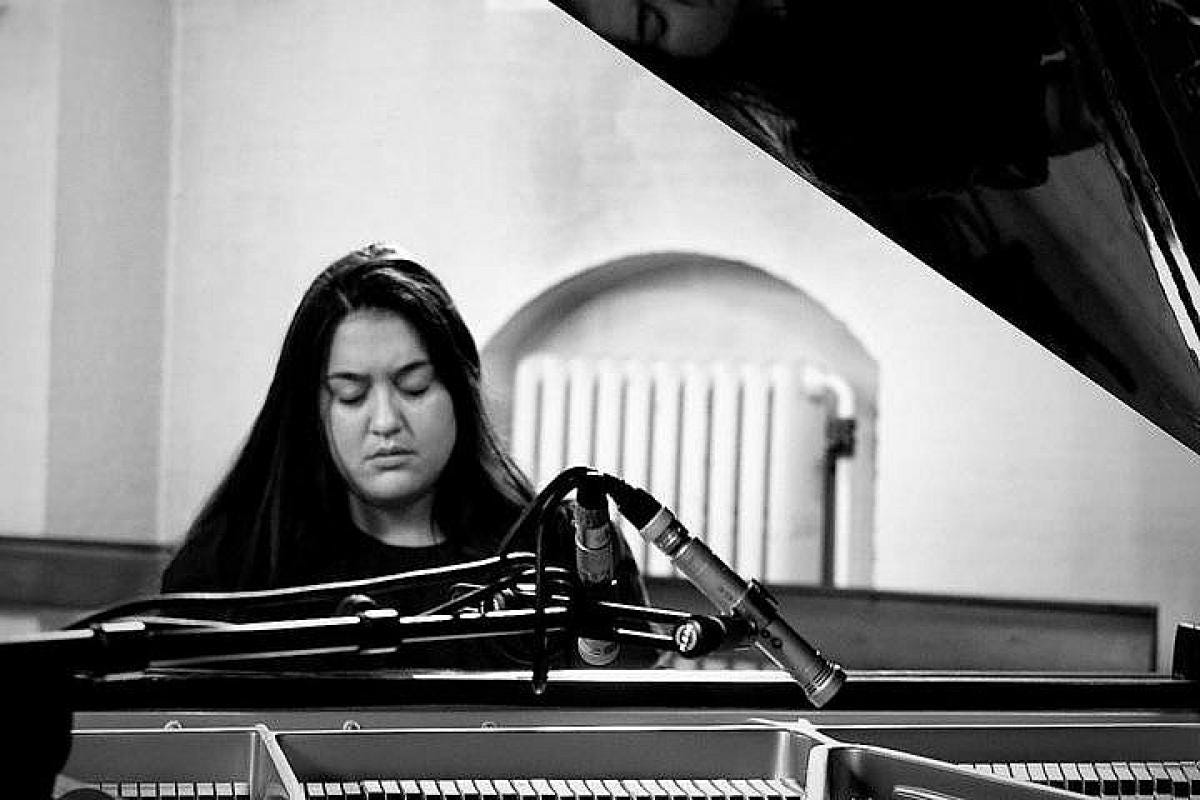Getting Back into Action
Jon Irabagon, Russ Johnson, Margaux Oswald
Things remain slow in Berlin, but the lull is about to end. The calendar for September is filling up, but there is still some activity here, even I won’t be around to catch much of it, with an upcoming trio to Jazzfest Saalfelden later this week. Consider this week’s edition of Nowhere Street a slight return before the fall deluge hits.
Chicago Returns: Jon Irabagon and Russ Johnson
A few weeks ago I had the pleasure of hearing the European premiere of vibraphonist Patrica Brennan’s excellent septet at Jazz em Agosto in Lisbon. The group includes a superb frontline, with trumpeter Adam O’Farrill and saxophonists Jon Irabagon and Mark Shim, which excelled both in articulating the terse, punchy charts that help give the music its fierce jagged thrust, and as fiery yet thoughtful soloists. I’ve long been an admirer of Irabagon, whom I first heard as a member of Mostly Other People do the Killing and have followed through a prolific career as a leader and sideman. In late 2020 he moved back to Chicago after spending nearly two decades in New York. He’s continued to work with his New York colleagues, but he’s also immersed himself in the current Chicago scene, and after about five years back in the Midwest he’s finally shared some of the new work he’s created in the area where he was raised. A devoted punster, he named his new quartet PlainsPeak, a phrase that references the no-nonsense, blue collar aesthetic that continues to define most music-making in Chicago.
The saxophonist enlisted the muscular, agile rhythm section of bassist Clark Sommers and drummer Dana Hill, along with trumpeter Russ Johnson, who himself had preceded Irabagon’s Midwest return from New York by a little less than a decade. Johnson played on the saxophonist’s 2008 debut album as a leader, so his inclusion adds some extra resonance to this endeavor. Last week the quartet dropped its debut album Someone to Someone (Irabbagast), a vibrant demonstration of inside-out playing from musicians deeply rooted in tradition while simultaneously devoted to outward bound exploration. Across six originals (seven if you include the hidden bonus track on the CD) the band nails the contours of the leader’s deceptively simple writing, playing as a tight-knit ensemble that can wrest free from form at any moment. Many of the tunes nonchalantly embrace the kind of inside-out approach embodied by Eric Dolphy, especially on the title track, with its woozy melody and the singing arco basslines of Sommers, which evoke the sorrowful improvisatory vibe of the late Richard Davis. Sommers and Hall possess a deep affinity and rapport, working together in many band over the last couple of decades, such as last year’s From Here, From There (Calligram), a sturdy hard bop date led by trombonist Andy Baker, who’s joined by Johnson on the frontline. “Someone to Someone” clocks in at under five minutes, but a world of tension, internal conversation, and harmonic stretching unfolds within its sleek confines. Check it out below.
The saxophonist’s liner notes double as a guided tour of Chicago where history and innovation are partners, evidenced by “Buggin’ the Bug,” a blues march with a deep groove. Irabagon and Johnson tear into the theme with gusto, improvising together for long stretches, while on “Malört is My Shepherd,” a reference to the beloved, undrinkable wormwood liqueur that’s a local staple, a measured theme opens up into glorious instability and seeking—a sonic match to the way the booze can unloose any sense of equilibrium as consumption increases—with some of the most ferocious and free playing on the album. The leader is a technical daredevil, but his virtuosity is always in service of the piece at hand rather than a feat unto itself, so the shifting time signatures that pop up in “At What Price Garlic” exist for the sake of variety rather than showboating. When I saw Irabagon he told me that when the album was cut in December of 2024 a second recording by the same quartet was made featuring Johnson’s compositions. A planned simultaneous release of the two albums didn’t happen, but it will surely surface down the road and it should be interesting to compare the two books of music.
Hopefully it won’t take as long to see release as the music on To Walk on Eggshells (ezz-thetics), a terrific trio session featuring Johnson with bassist Christian Weber and drummer Dieter Ulrich recorded in Zurich back in December of 2009. The bassist had access to Swiss radio’s studio for two days to work with trumpeter Nate Wooley and drummer Paul Lytton, but it only took a single day to make the music that turned up on the 2012 album Six Feet Under (No Business), so the following day he gathered Johnson and Ulrich for a second session. While the recording captures a first-time meeting, the results suggest the work of kindred spirits, with each bringing in original tunes for the session. Weber and Ulrich make for a flinty rhythm section, giving Johnson a strong foundation while simultaneously prodding and cajoling his playing with a mixture of driving swing and deliciously bumpy accents. Trumpet trios are febrile, often dangerous settings, giving the horn player little margin for error—no harmony instrument to muddy the waters, no second melody instrument to swoop in at difficult moments—but Johnson has repeatedly proven his mettle. His playing on the 2023 album Live at the Uptowner (Calligram), capturing a date led by Milwaukee drummer Dave Bayles with bassist Clay Schaub offers another case-in-point, as he unleashed endless melodic and rhythmic invention without a stumble. Below you can hear the opening track, a Johnson tune called “Lifted.”
Different Sides of Pianist Margaux Oswald
On Thursday, August 21 the Copenhagen-based pianist Margaux Oswald returns to Berlin, playing in a trio with alto saxophonist Chris Pitsiokos and drummer Michael Griener at Richten25. The pairing makes sense, considering how she and the reedist both love conjuring violent sonic eruptions and sustained intensity. When I wrote about Oswald last year I focused on the galvanic, left-handed fury that marked most of the recordings I’d heard by her, but some subsequent released have filled out the picture a bit, including last year’s In Time, Hollow Oaks Become Chapels (Clean Feed), an album billed to her ensemble Collateral Damage. She surrounds herself with three double bassists (Aurelijus Užameckis, Uldis Vītols, and Rafal Rózalski), two electric guitarists (Niklas Fite and Hein Westgaard), and drummer Simon Forchhammer for a session heavy on febrile texture, frictive interplay, and surprising expanses of space.
The music is all improvised, but there is a clear scheme guiding the performance, which never devolves into chaos or brutality. Instead the listener can pick up the way the various lines and timbres shift and collide, the strummed, plucked, and bowed strings surrounded if not tamed a bit by piano and drums. The music expresses Oswald’s overarching interest in viscous sound, but unlike the bruising clouds of overtones and left-handed fire she’s often produced in solo and duo settings, here her playing is comparably restrained, arriving in percussive runs, terse rumbles, and broken-glass spasms. Despite the definition of individual voices, the music definitely conveys an ensemble ethos—it’s not about any single thread, but instead about the totality of knotty gestures, untangled threads and massed thrumming. You can hear the elements coming together and pulling apart on “Nicelse,” below.
Oswald takes a more conventional role on Xanthic Tales (Sonic Transmissions), an improvised trio session with trumpeter Oscar Andreas Haug, a key member of Amalie Dahl’s quintet Dafnie, and the Berlin-based Argentine drummer Axel Filip. Perhaps it’s surprising given the lack of a bassist that Oswald doesn’t lean more heavily into left-handed thunder, but it’s not as if the trio is lacking in sonic depth. Haug seems to bring out a more restrained, lyric quality in the pianist, who deftly frames his lyric blowing with a lighter touch than I’d heard on older work. Of course, the melodic content doesn’t cancel out the trio’s more exploratory side, with timbral explorations on tracks like “Age Old Quest,” a rather spacious, slow-moving set of tightly-coiled interactions. It should be interesting to hear Oswald navigate the Berlin trio given Griener’s deep swing roots and Pitsiokos’ penchant for disruption. Of course, those are simply dominant sides of their musical personalities, not definitions of their aesthetic, just as Oswald can do much more than conjure turbulent eddies of sound. You can hear the more tuneful opener “Loved One” below.
Recommended Shows in Berlin This Week
August 19: Zinc & Copper (Elena Kakaliagou, French horn, Hilary Jeffery, trombone, trumpet, and Robin Hayward, microtonal tuba) and Robyn Schulkowsky, percussion, tubes, 7:30 PM, St. Matthäus-Kirche, Matthäikirchplatz, 10785 Berlin
July 19: oneblockwest (Thomas Borgmann, reeds, Jan Roder, double bass, and, Joe Hertenstein, drums), 8 PM, Galiläakirche, Rigaer Str. 9, 10247 Berlin
August 20: S Trio (Ignaz Schick, Chris Heenan, and Peter Van Huffel, alto saxophones), 6 PM, Café Plume, Warthestraße 60, 12051 Berlin
August 20: Hedvig Mollestad Trio (Hedvig Mollestad, guitar, Ellen Brekken, bass, and Ivar Loe Bjornstad, drums), 8 PM, Neue Zukunft, Alt-Stralau 68, 10245 Berlin
August 21: Margaux Oswald, piano, Chris Pitsiokos, alto saxophone, and Michael Griener, drums; Olaf Rupp, guitar, and Jan Roder, double bass, 8 PM, Richten25, Gerichtstraße 25, 13347 Berlin
August 22: Achim Kaufmann, piano, Maike Hilbig, double bass, and Lucía Martínez, drums, 8:30 PM, Sowieso, Weisestraße 24, 12049 Berlin
August 23: Allegra Krieger; Angelic Milk, 8 PM, Kantine am Berghain, Am Wriezener Bahnhof, 10243 Berlin
August 23: Aki Takase, piano, Mike Majkowski, double bass, and Dag Magnus Narvesen, drums, 8:30 PM, Sowieso, Weisestraße 24, 12049 Berlin
August 24: Rebecca Lane, flute; Pharoah Chromium; Clara de Asís, modular percussion; ゴマサン (Romain C. Bertheau), organ, 6:30 PM, Taborkirche, Taborstraße 17, 10997 Berlin
August 25: Ya-Nung Huang, suona, and Tsung-Yun Lai, modular synthesizer; Aluan Wang, audio-visual performance; Audrey Chen, voice, electronics, Henrik Munkeby Nørstebø, trombone, electronics, and Raed Yassin, synthesizers, electronics, 8:30 PM, Morphine Raum, Köpenicker Straße 147, 10997 Berlin (Hinterhof 1. Etage)




